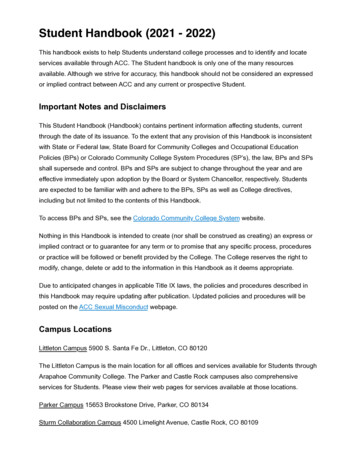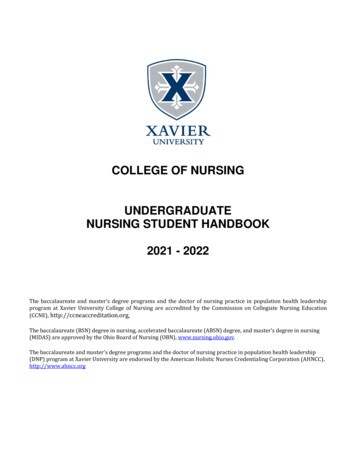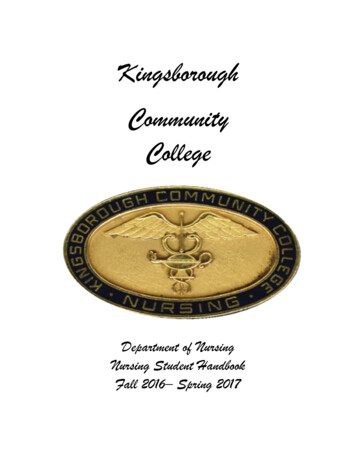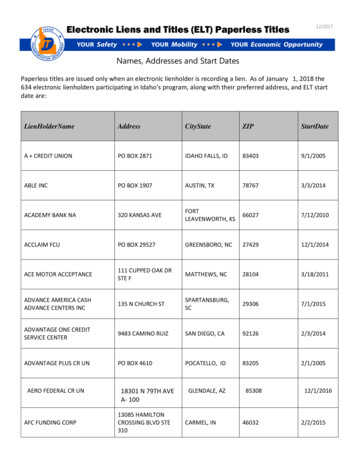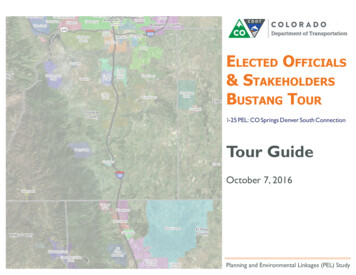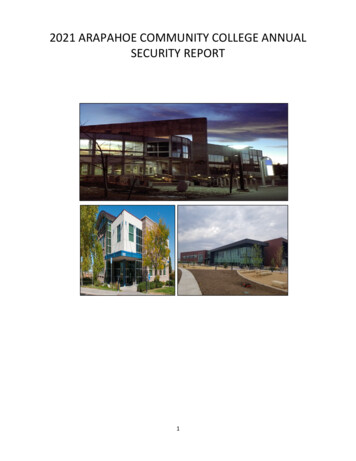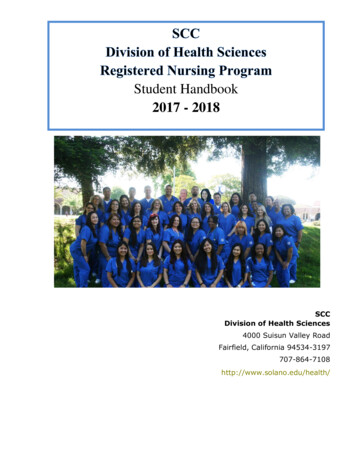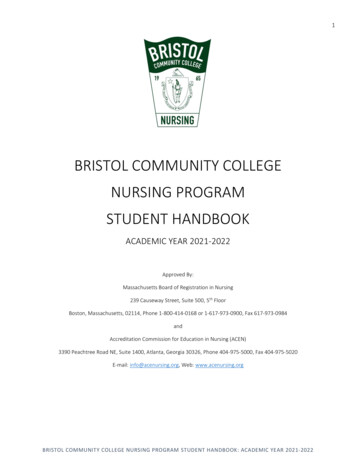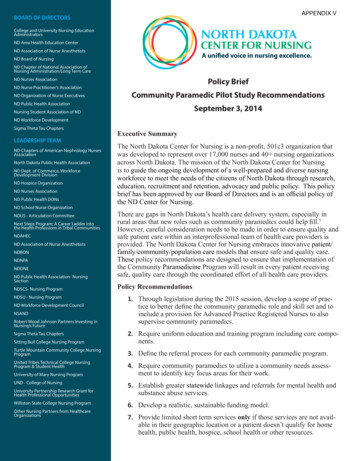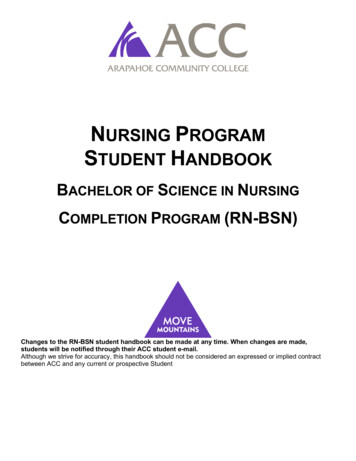
Transcription
NURSING PROGRAMSTUDENT HANDBOOKBACHELOR OF SCIENCE IN NURSINGCOMPLETION PROGRAM (RN-BSN)Changes to the RN-BSN student handbook can be made at any time. When changes are made,students will be notified through their ACC student e-mail.Although we strive for accuracy, this handbook should not be considered an expressed or implied contractbetween ACC and any current or prospective Student
Table of ContentsNURSING PROGRAMSTUDENT HANDBOOK . 1BACHELOR OF SCIENCE IN NURSING COMPLETION PROGRAM (RN-BSN) . 1PROGRAM INFORMATION . 4A. Program Description and Occupational Information . 4B. Accreditation . 4C. College Information . 4D. Non-Discrimination Statement. 4E. Title IX: Sexual Misconduct, Discrimination, Harassment and FERPA . 5F. School of Health and Public Services . 5G. Advisory Committee and Shared Governance . 5H. Faculty . 5I. Nursing Program Mission . 5J. Philosophy and Core Values . 6K. RN-BSN Nursing Program and End of Program Student Learning Outcomes . 61. Retention/Graduation: At least 80% of the students enrolled in the RN-BSN will complete the nursingprogram within 150% of the program length from the date of the first nursing course. 6GENERAL INFORMATION. 7A. Advising . 7B. Sequence of Courses . 7C. Attendance Guidelines . 7D. Practicum Experience Attendance Policy . 7E. Lines of Communication and Conflict Resolution . 8F. Professional Appearance . 8G. Information Technology . 9PROGRESSION AND RETENTION. 9A. Progression . 9B. Grading . 10C. Academic Success Plan . 10D. Withdrawal . 10E. Graduation Requirements . 10READMISSION GUIDELINES. 10A. Eligibility for Readmission . 10B. Process for Readmission . 11HEALTH AND SAFETY GUIDELINES . 11A. Health Declaration . 11B. Health and Safety Requirements . 11C. Reasonable Accommodations. 12D. Essential Skills and Functional Abilities for Nursing Students . 13E. Pregnancy . 16F. Health and Injury . 16G. Safety Advisory and Guidelines . 17H. Drug Screening Guidelines . 18I. “Reasonable Suspicion Based” Drug Testing . 19J. Readmission Guidelines related to Substance Abuse . 20GUIDELINES FOR STUDENT CONDUCT . 20A. Standards of Professional Conduct . 20B. Expectation in Reporting Unprofessional Conduct . 21ACC NURSING RN-BSN Completion Program Student Handbook FINAL 12.20202
C. Professional Boundaries . 21D. Health Insurance Portability and Accountability Act (HIPAA) . 21E. Disciplinary Procedures. 22F. Academic Misconduct . 22G. Nursing Student Conduct and Demeanor. 22H. Practicum Misconduct. 22I. Student Due Process . 23ONLINE CLASSROOM AND PRACTICUM INFORMATION. 23A. Written Assignments . 23B. Examinations. 23C. Practicum Rotations . 24GENERAL EDUCATION REQUIREMENTS. 25ACADEMIC PLAN: BACHELOR OF SCIENCE – NURSING . 26REQUIRED COURSES . 26GENERAL EDUCATION COURSES. 26MAJOR COURSES . 26PRE-REQUISITE . 26PRE-REQUISITES, CO-REQUISITES, AND RECOMMENDATIONS (GRADE C OR BETTER REQUIRED). 26PROGRAM OUTCOMES. 27EXAMPLE OF COURSE SEQUENCE FULL-TIME TRACK ( 4 SEMESTERS INCLUDES GENERAL EDUCATION REQUIREMENTS) . 28EXAMPLE OF COURSE SEQUENCE FULL-TIME TRACK (THREE SEMESTERS FOR STUDENTS WHO HAVE COMPLETEDGENERAL EDUCATION REQUIREMENTS) . 29EXAMPLE OF COURSE SEQUENCE PART-TIME TRACK (INCLUDES REQUIRED GENERAL EDUCATION) . 30A.RN-BSN NURSING PROGRAM STUDENT HANDBOOK AGREEMENT . 32B.ACC RN-BSN NURSING PROGRAM GUIDELINES AND EXPECTATIONS FOR PRACTICUM STUDENTAGREEMENT . 33C.ACC NON-PAID COOPERATIVE EDUCATION STUDENT VERIFICATION FORM FOR WORKER'SCOMPENSATION*. 34D.NURSING STUDENT CONFIDENTIALITY AGREEMENT . 34E.EXAM RESPONSIBILITIES . 35F.DISQUALIFYING OFFENSES. 35ANA CODE OF ETHICS . 36AMERICAN NURSES ASSOCIATION (ANA)- STANDARDS OF PRACTICE AND STANDARDS OF PROFESSIONALPERFORMANCE . 37STUDY SKILLS GUIDE - DAY-TO-DAY STUDY SKILLS . 39ACC NURSING RN-BSN Completion Program Student Handbook FINAL 12.20203
PROGRAM INFORMATIONA. Program Description and Occupational InformationGraduates receiving a Bachelor of Science Degree in Nursing (BSN) are provided a broader spectrumof career opportunities (including specialties) within the nursing profession. The RN is educated as ageneralist who delivers health care to clients and family groups and has competencies related to the artand science of nursing. The RN may be employed in a variety of acute, long-term and communitybased health care settings, in the areas of Maternal Child Nursing, Medical Surgical, Psychiatric andPublic Health Nursing. Registered Nurses function within the legal scope of practice and useprofessional standards of care when caring for clients and families across the life span. The RN‐BSNProgram is designed for Registered Nurses who wish to earn the baccalaureate nursing degree or forcurrent nursing students (dual enrollment) who are enrolled in a Colorado Nursing AAS program whowish to earn the baccalaureate nursing degree. The focus of the program is to add value to nursingeducation through the interpretation of research, broaden perspectives of population and communitycare, enhance leadership and care coordination skills and promote life‐long learning within the nursingprofession. The BSN degree is a step towards advanced nursing roles such as leadership or nurseeducator positions.B. AccreditationArapahoe Community College (ACC) is accredited by The Higher Learning Commission. TheCommission can be reached at 312.263.0456 or by accessing website www.hlcommission.org TheCollege operates under the jurisdiction of the Community Colleges of Colorado (CCCS). ACC studentsregularly transfer credits to state colleges and universities within Colorado. Transfer information isavailable in the Academic Advising Office, Room M2010Effective 12/02/2019, the RN to BSN nursing program at Arapahoe Community College, located inLittleton, Colorado, is a candidate for initial accreditation by the Accreditation Commission for Educationin Nursing. This candidacy status expires on 12/02/2021.Accreditation Commission for Education in Nursing (ACEN)3390 Peachtree Road NE, Suite 1400Atlanta, GA 30326(404) 975-5000View the public information disclosed by the ACEN regarding this candidate program pC. College InformationGeneral information about Arapahoe Community College, including and not limited to academiccalendar, hours of operation, student services, employee directory, crime statistics, catalogs,schedules, etc. can be accessed through the ACC website .D. Non-Discrimination StatementArapahoe Community College prohibits all forms of discrimination and harassment including those thatviolate federal and state law or the State Board for Community Colleges and Occupational EducationBoard Policies 3-120 or 4-120. The College does not discriminate on the basis of sex/gender, race,color, age, creed, national or ethnic origin, ancestry, physical or mental disability, veteran or militarystatus, pregnancy status, religion, genetic information, gender identity, or sexual orientation in itsemployment practices or educational programs and activities. Arapahoe Community College will takeappropriate steps to ensure that the lack of English language skills will not be a barrier to admissionand participation in vocational education programs.ACC NURSING RN-BSN Completion Program Student Handbook FINAL 12.20204
E. Title IX: Sexual Misconduct, Discrimination, Harassment and FERPAUnder Title IX of the Education Amendments of 1972, “No person in the United States shall, on thebasis of sex, be excluded from participation in, be denied the benefits of, or be subjected todiscrimination under any education program or activity receiving federal financial assistance.” Inaddition to protecting students, faculty, and staff from discrimination and harassment based upon sex,gender identity, and sexual orientation, Title IX of the Education Amendments of 1972 also prohibitsany form of discrimination based upon pregnancy or related conditions.The College has designated Angela Johnson, Human Resources Director, as its Affirmative ActionOfficer/Equal Opportunity Coordinator/Title IX Coordinator and Jennifer Husum, Associate Dean ofStudents for Equity and Compliance, as its Deputy Title IX/ Equal Opportunity/ADA Coordinator with theresponsibility to coordinate its civil rights compliance activities and grievance procedures. Forinformation, please contact Angela at 303.797.5715 or Jennifer at 303.797.5674, emaileoandtitleIXcoordinator@arapahoe.edu or Arapahoe Community College, 5900 S. Santa Fe Drive,Littleton, CO 80120.You may also contact the Office for Civil Rights, U.S. Department of Education, Region VIII, FederalBuilding, 1244 North Speer Boulevard, Suite 310, Denver, CO 80204, telephone 303.844.3417.FERPA: The Nursing program follows all Family Educational Rights and Privacy Act (FERPA) of 1974guidelines as required by federal law and ACCF. School of Health and Public ServicesThe Nursing Program is one of the health programs offered at ACC and is part of the School of Healthand Public Services (HPS), ACC Instructional Division. The Dean of HPS is Darius Navran PhD and theVice President of Instruction is Rebecca Woulfe PhD. Their offices are located in the Annex Building,Room 2000 (A2000) and are open during usual business hours, Monday through Friday, 8:00 a.m. to5:00 p.m. During COVID restrictions office hours may vary.G. Advisory Committee and Shared GovernanceThe Advisory Committee for the RN-BSN Nursing Program is composed of a representative group ofrespected nursing administrators and staff from several metropolitan health care institutions, facultymembers, alumni, and students. The purpose of the committee is to review curriculum, policies, andprocedures, and make recommendations to the faculty regarding their appropriateness to the currentpractice of nursing. The committee also provides accurate occupational information including trends inemployment.Student representation in the Nursing Program’s governance activities is achieved by studentvolunteers who serve on one of the Nursing Program committees including Faculty and Student Affairs,Curriculum, and Evaluation. The Nursing Program committees have Nursing Program faculty and staffrepresentation, and a volunteer student representative who has demonstrated leadership skills in theirfirst year of the program. Students attend committee meetings and offer input to committee membersabout issues that impact student success and life within the program.H. FacultyACC nursing faculty teaching in the RN-BS program hold Doctorate of Nursing Practice (DNP) andMaster of Science Nursing (MSN) degrees in an area of specialization: Medical-Surgical, Pediatrics,Maternity, Psychiatric Nursing, Leadership, Public Health, and Nursing Education. All have hadexperience as nurses and educators prior to coming to ACC. For specific information about individualfaculty, please see the Arapahoe Community College website or the faculty member.I. Nursing Program MissionThe mission of Arapahoe Community College, Department of Nursing is to advance professionalnursing practice by delivering high quality, accessible education which prepares learners to meetcomplex health and wellness needs of diverse clients and communities.ACC NURSING RN-BSN Completion Program Student Handbook FINAL 12.20205
J. Philosophy and Core ValuesThe philosophy of the nursing faculty is in harmony with and supports the ACC mission statement. Thephilosophy of ACC’s Nursing Department is based on the following core values:Life-long Learning – Nursing practice is constantly evolving and information technologies are everchanging, the ability to adapt and grow professionally is essential.Respect for Differences – Everyone is shaped and influenced by unique life experiences. Diversityenriches the environments in which we live, work, and learn.Culture of Caring – Compassionate, culturally competent care better serves clients and communitiesand supports a holistic, patient-centered focus.Integrity – Honesty, ethical practice, respect, and personal accountability in all interactions, personal,professional and academic.Quality – Promoting a culture of inquiry and a mindset of continual quality improvement advances safe,evidence-based practice through the science of nursing.Community – Fostering partnerships, teamwork and respectful communication with multiple disciplinesas a collaborator and manager of care needs across the healthcare continuum.K. RN-BSN Nursing Program and End of Program Student Learning Outcomes1. Retention/Graduation: At least 80% of the students enrolled in the RN-BSN willcomplete the nursing program within 150% of the program length from the date of thefirst nursing course.2. Job Placement: At least 85% of graduates who return the post-graduate survey areemployed within 12 months of RN-BSN3. Attainment of End of Program Student Learning Outcomes: 98% of students earn atleast 77% or passing score on each evaluation criteria.End of Program Student Learning OutcomesAfter completing the RN-BSN program, the graduate will be able to: Quality care: Interpret research to employ best practice. Use data to monitor the outcomes of careprocesses. Propose an evaluation process to continuously improve the quality and safety of healthcare systems and deliver quality care to individuals and diverse populations. Professionalism: Formulate a plan that demonstrates an enhanced commitment toprofessionalism embracing excellence, caring, legal and ethical practice, civility, accountability, andprofessional development. Communication: Evaluate communication and collaboration with colleagues, interprofessionalgroups and members of the community to promote health safety and well-being across the lifespanand across the continuum of healthcare environments. Leadership: Evaluate the contribution of leadership, quality improvement principles, and impact oforganizational systems in transforming, managing, and coordinating safe, quality, cost effective,person-centered care. Critical Thinking/Practicum Reasoning: Integrate a systematic process of critical inquiry withnursing science, natural and behavioral sciences, arts and humanities to make evidence-basedpractice decisions to improve the care of individuals, families, populations, and communities.ACC NURSING RN-BSN Completion Program Student Handbook FINAL 12.20206
GENERAL INFORMATIONA. AdvisingAcademic advising and general college information is available at all three ACC campuses and providescomprehensive services to assist new and current students to develop plans to complete Nursing Programcourses, understand policies and procedures, and access campus resources to facilitate student success.Please refer to the Academic Advising hours for each campus on the ACC Website.The BSN Coordinator provides individualized RN-BSN program admission, progression, and graduationadvising to all enrolled RN-BSN students. She can be contacted for program information and creation of anindividualized academic progression plan at mary.steggall@arapahoe.edu. General program informationmay be obtained from the program administrative assistant at nursing@arapahoe.edu.B. Sequence of CoursesNursing courses are sequential as provided in the academic plan. MAT 135 and ENG 122 areprerequisites before taking NUR303 – Research/Evidence Based Practice. All required 300 level coursesshould be completed before starting 400 level course work. NUR409 and NUR410, which includepracticum hours, require an active unencumbered RN license as noted on academic plan. NUR411 SeniorSeminar is the capstone course and should be completed in the final semester of the program.Students may take an upper division nursing course at another college only with written permission of theNursing Director or RN-BSN Coordinator and completion of required transfer paperwork of the school towhich the student wishes to transfer. General education courses required for BSN should be completedprior to the final semester of course work.C. Attendance GuidelinesStudents must be registered for a class in order to participate in the class online.It is the responsibility of the student to complete the withdrawal process should he or she wish todiscontinue a course of study or attendance at the college. Please consult the ACC College Catalog forspecific information regarding procedures, financial aid implications or academic standing information.Nursing courses prepare students for safe client care and faculty expect students to participate in eachcourse and practicum experience to develop the theoretical and practical components of thebaccalaureate professional nursing role. It is the responsibility of the student to notify the instructor priorto an absence in the course.Theory/Didactic: Students are expected to participate in all courses for which they are registered,except in cases of illness or other emergencies. Online course attendance policies are explained inindividual course syllabi.D. Practicum Experience Attendance PolicyIn courses with a practicum experience, participation and attendance are mandatory. If a student isunable to complete the practicum experience, course failure may result. Behaviors leading to coursefailure will include:oFailure to notify faculty of an absence or tardiness (no call/no show) during practicumexperience.oIncomplete practicum experience hours due to failure of the student to secure a practicum site,noncompliance with dress code, alleged violations of the Student Code of Conduct orestablished expectations.ACC NURSING RN-BSN Completion Program Student Handbook FINAL 12.20207
E. Lines of Communication and Conflict ResolutionThere is an expectation of mutual respect and civility between faculty and students. If an issue shouldarise, the student should schedule a meeting with the faculty member to discuss the issue. Quite often,issues can be resolved through direct communication between the faculty member and the student. Ifthe issue is not resolved, involvement of the RN-BSN Coordinator or Nursing Program Director may bepursued.Should a student feel that he or she has been treated unfairly or unjustly and is unable to resolve thematter informally, the student may elect to file a complaint by following the process established throughthe Student Grievance Procedure available in the ACC Student Handbook. Academic or instructionalconcerns, such as grading or course processes found in the course syllabus, should be directed initiallyto the Instructor or Faculty of that course. A Student could choose to escalate the concern beyond theInstructor or Faculty by contacting the RN-BSN Coordinator, Nursing Program Director, or InstructionalDean. Allegations that a decision was motivated by discrimination and/or harassment should be filedunder the college’s Civil Rights Grievance and Investigation Process.F. Professional AppearanceStudents must always present themselves in a professional manner while enrolled in the NursingProgram. Students must be in compliance with the professional dress code guidelines at all times toremain in the practicum setting. If there are exceptions, alternate styles of dress will be determined anddescribed by the faculty member involved. The following guidelines are mandatory for students toremain in compliance with the dress code: Picture ID badges are always to be worn above the waist with the picture facing forward in thepracticum setting. Jewelry worn at the practicum setting should be minimal. Small post earrings (single pair) and awristwatch are acceptable. Earring gauges are not allowed. In certain practicum experiences, itmay be advisable to not wear any jewelry. Medical alert jewelry is acceptable. No visible facial or body piercing jewelry or tattoos are allowed. No objects of any type may be wornin the tongue. If necessary, a small beige bandage is permitted to cover a visible piercing and allvisible tattoos should be covered. In all cases, the student must be in compliance with theprofessional appearance policy of the practicum agency. Hair must be clean, natural in color (not pink, blue, etc.), and worn back from the face while inuniform to meet health and safety standards. Extreme hair styles are not permitted in practicumsettings. Closely trimmed beards, sideburns and mustaches are permitted but must meet facilitypolicy for client safety. Makeup should be minimal. Gum chewing while in the practicum setting is prohibited. Clothing must be clean and wrinkle-free. Undergarments should be worn at all times and cannot bevisible. Students are expected to maintain appropriate personal hygiene, including oral care. Students willbe free of offensive body odor and/or cigarette smell. No cologne, after-shave, scented lotionsand/or perfume are permitted. Fingernails must be clean and short with no nail polish. Artificial nails, nail wraps or extenders arenot permitted in the lab or practicum setting.Unacceptable Attire in the Practicum Setting and Sponsored Events:
(RN-BSN) Changes to the RN-BSN student handbook can be made at any time. When changes are made, students will be notified through their ACC student e-mail. Although we strive for accuracy, this handbook should not be considered an expressed or implied contract between ACC and any current or prospective Student
